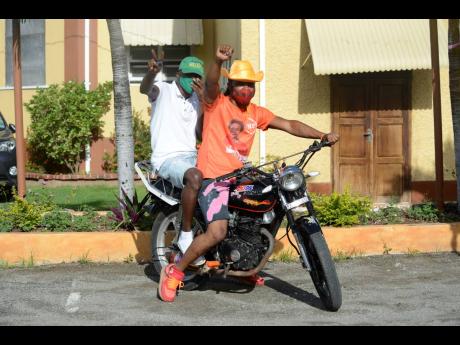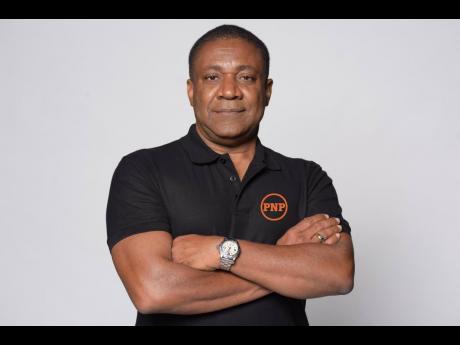Phillip Paulwell | Understanding Jamaica’s political divisiveness
On July 28, The Gleaner published a report on statements made by former Prime Minister Bruce Golding under the heading “‘We have messed up”.
He, essentially, pointed fingers at “successive administrations” that failed to advance Jamaica’s interests fully. Mr Golding’s arguments are debatable and require far more deliberate analysis in light of the roles played by campaign manifestos. Campaign manifestos always proclaimed the pre-eminence of the national interest. However, as proclaimed by these manifestos, the national interest seemed to be overtaken by other considerations when various administrations implement their mandates.
Perhaps the fact that our political system of majoritarian politics lies on the bedrock of expected divisiveness where there has to be a Government and an Opposition isn’t carefully understood by all. In order to hold on to power, the political parties have to either use State resources to advance their political and policy agendas when in power or seek to undermine and challenge the Government of the day when in Opposition as a means to seturn to power. Likewise, the premise of the political process is one in which there is a rotation of power whereby the pendulum swings between the People’s National Party (PNP) and the Jamaica Labour Party (JLP).
After 60 years of Independence, that is how our political system works. Hence, to blame politicians – who, by the way, must bear “their share of the blame,” as Mr Golding stated – also requires further analysis. No opposition party has engaged in the process of supporting a government blindly in the name of national unity and, by virtue of that approach, keeping themselves permanently in opposition. Political parties have different policy perspectives and positions and will not agree. Sometimes, within the parties themselves, there can be divisiveness over different outlooks on how the respective parties should frame their positions.
NO ROOM FOR THIRD PARTIES
Further, there is no room for third parties in our political process, and Mr Golding – of all people – should know this as he left the JLP in 1995 to form the National Democratic Movement (NDM). Mr Golding and his party failed to win any seats in the 1997 general elections, leaving him with no option but to rejoin the JLP in 2002, becoming prime minister in 2007. Michael Williams, the NDM general secretary, told The Gleaner on December 16, 2009, “We are bitter. We are upset that a person who could speak so eloquently in support of our policies has not found himself capable of implementing one of those policies now that he is prime minister.” Sticking with your party through thick and thin is a quality that politicians must demonstrate in our political system.
Political divisiveness can take many forms. However, internal divisiveness is the most devastating and can assist the other main party to remain in power when the prime minister calls a general election. Both the PNP and the JLP have suffered such misfortunes. How they go about repairing the damage is the biggest challenge of all. The pendulum swings that brought the PNP and the JLP to power over the last 25 years have had their fair share of alternating internal divisions within the ranks of their opponents to facilitate the process of getting elected. When those parties heal their internal divisions, they usually become stronger forces for the next time they have to face a general election.
Our political reality is that divisiveness is a requirement in the conduct of our political process. Hence, the idea of consensus is foreign as we don’t have a consensual system of government composed of coalitions that bring different political perspectives and personalities together for the country’s good. Nevertheless, in other CARICOM jurisdictions, the coalition approach has been tried with limited success in Trinidad and Tobago (1995-2010), St Kitts-Nevis (2015 and 2020), and Guyana (1968 and 2015). Except for Guyana, which has an entirely different electoral system to ours, the coalition experiments in Trinidad and Tobago and StKitts-Nevis eventually failed. And they have all returned to the original Westminster model of single-party governments. These CARICOM states that flirted with coalition politics did so to build broader electoral bases, and in so doing, created enhanced opportunities for later electoral success. Trinidad and Tobago and Guyana have ethnically mixed societies, while in St Kitts-Nevis, there is a strong regional divide between both islands of the federation. We do not have those political dynamics; however, our parties are capable of internal divisions, which can be electorally harmful. Political partisanship contributes to the divisiveness that Golding spoke about, while the issue of internal division is far more harmful to political parties.
NOT COMPROMISED
Our political divisiveness has not compromised the level of Jamaican patriotism over the past 60 years. We are a model on the world stage for athletics, music, culture, cuisine and, yes, our political stability. Despite all the talk of divisiveness, we have done well after 60 years of Independence.
The JLP has held power over the following periods of our history, 1962-1972, 1980-1989, 2007-2011 and from 2016 onward. Likewise, the PNP held power from 1972-1980, 1989-2007 and 2011-2016. We have both had our turns at the wheel of power, and the ship of state has remained politically steady. The maintenance of a politically steady ship of state is an achievement no matter how minor it may be to some people. It’s indeed a credit to those who have gone before us. However, there is still much work to be done as we continue to build a society that addresses our economic, social, and political development.
Republicanism appears to be the next stop on our journey of constitutional evolution. We need to manage this process in a bipartisan manner that will not fall into the pitfalls articulated by Mr Golding because if it does, it will be “messed up”, to use his words. The republic is for all of Jamaica, and the Government needs to get this right so that when the parliamentarians vote in Parliament, there will be a consensus. Likewise, this same consensus will hold when the general population votes in the referendum as the parliamentarians will take a unified position to offer our respective supporters – articulating the message of Bob Marley, One Love, for our new republic.
We can come together for these big initiatives and make them work so that we can overcome whatever checks and balances were built into the constitution in 1962 to prevent any abuses of power in making constitutional changes by consensus and ot hegemony. Perhaps we should use this opportunity, as we try to forge a national consensus, to also remove from political contention and gamesmanship the triple national concerns of crime and violence, education, and housing.
- Phillip Paulwell is member of parliament for Kingston East and Port Royal and former minister of science, technology, energy, and mining. Send feedback to columns@gleanerjm.com.


